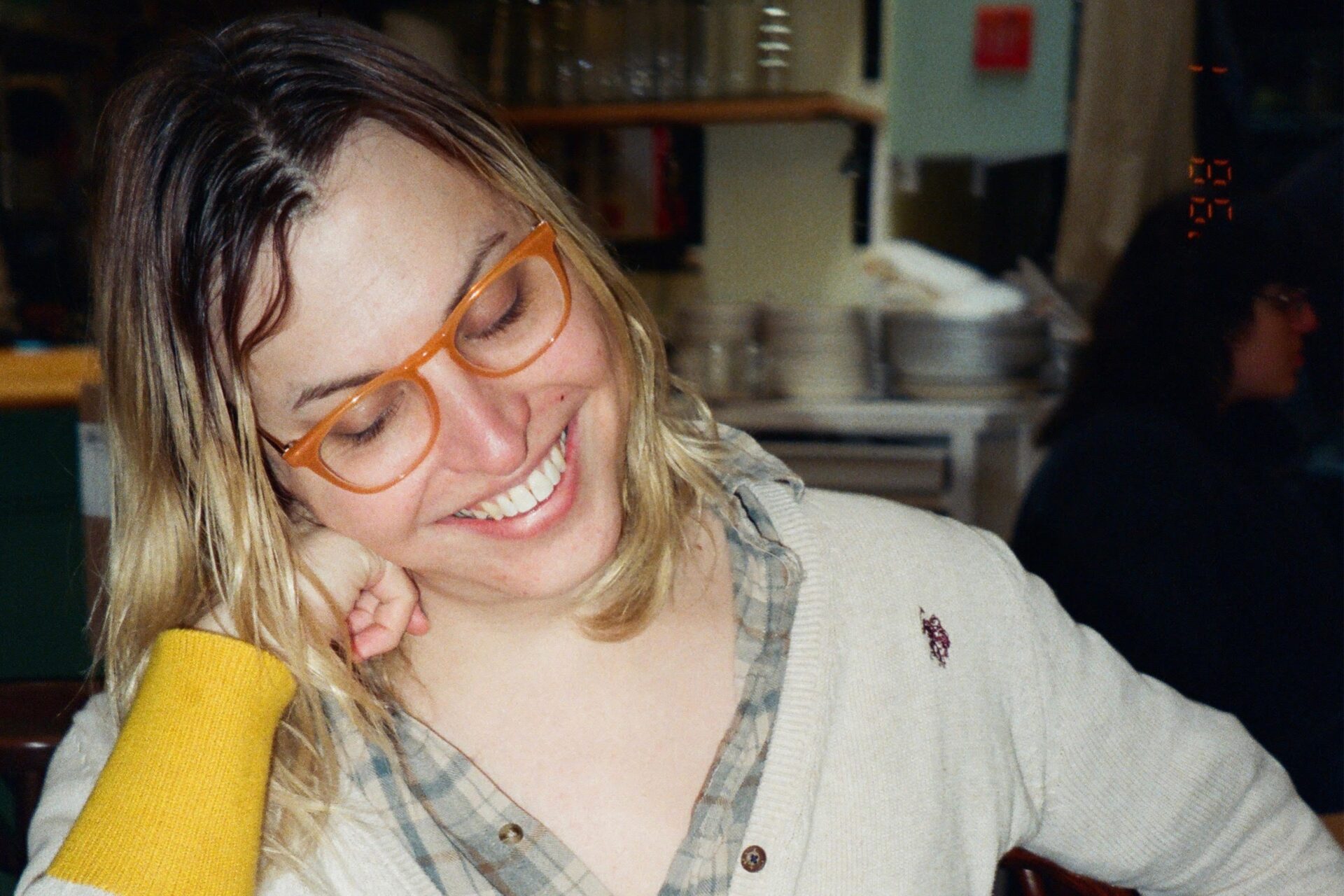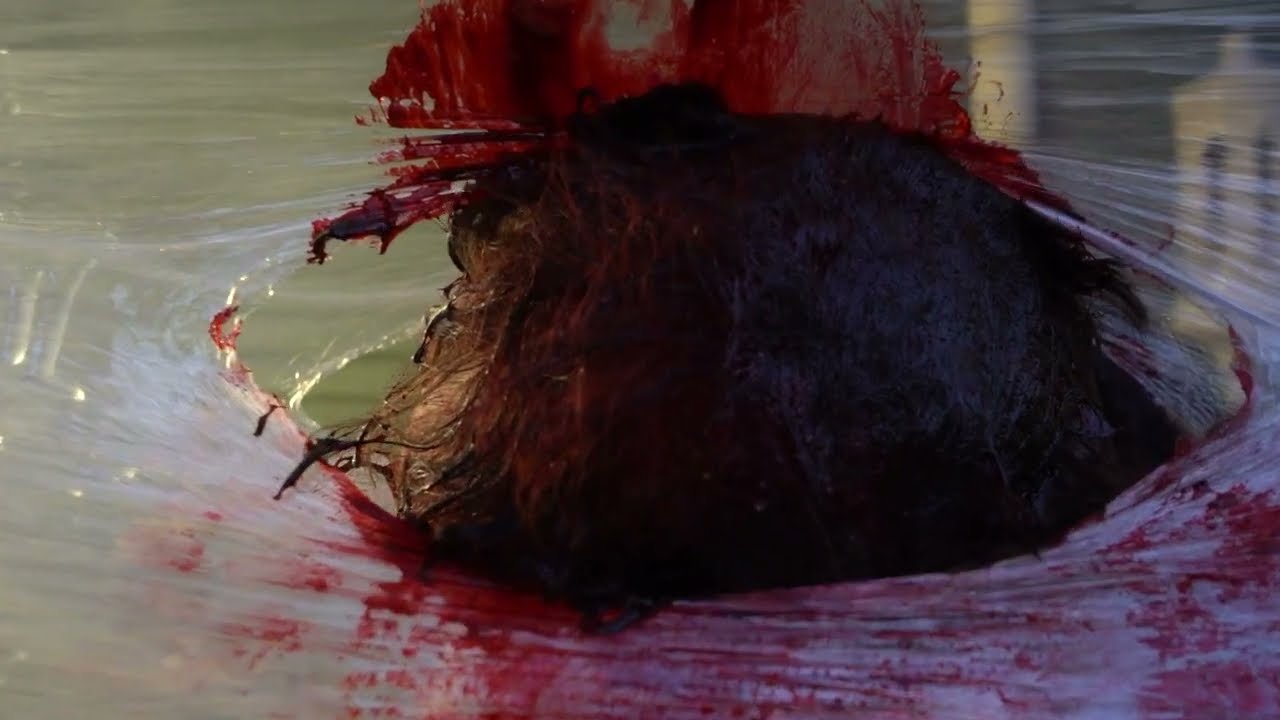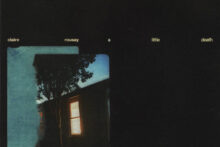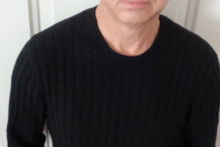More Eaze’s music occupies liminal zone; in the escape from Texas and the drift back toward it. Last year, for a number of reasons, she finally decided to leave her birthplace, The One Star State, for New York City. “There are literally hundreds of reasons to not be in Texas. Last summer it was 105 degrees for six weeks, and I remember one moment that broke me,” Mari Maurice tells me. She is an experimental violinist, composer and producer with stylistically varied music spread over labels like Orange Milk or OOH-sounds and emo-ambient exponent with another Texan Claire Rousay.
“I played at this festival in Austin, and I was watching Godflesh – I love Godflesh – but I had heat stroke [and was having a] panic attack because it was so hot and loud. I told to myself: ‘This is it. I’m never living in Texas again for another summer – I cannot survive this.” One can only imagine that Justin K. Broadrick howling with distorted voice “Vision, escape/ Vision, this feels right/ Hell, is where I lie” into the slow-rolling guitars of ‘Streetcleaner’ was a convincing wake-up call and a feverish catalyst of subsequent events.
The brutal heat was also frustrating when making music. Maurice’s last flat back in Austin didn’t have central air conditioning, so she had to have a mobile air conditioner running all the time, which made it impossible to record acoustic music, as the noise was bleeding over in her minimalistic compositions. At the same time, her decade-long marriage ended, which “was a huge life change [as it was] a big part of why I had stayed in Texas was to be with this person”. The divorce was followed by a toxic relationship with a new person where “all the worst things you could possibly imagine happened”.
This would have been enough on its own but then we also have to consider the oppressive climate created by a Republican-led array of anti-gay and anti-trans bills passed through the senate, restricting teaching about gender and sexuality in schools and banning access to transgender care and gender-transition treatment for minors. Texans affected by the legislation described it as “a total witch-hunt”, and last year saw LGBTQ+ people fleeing the red states in numbers. More Eaze was one of them.
“It does an untold amount of psychic damage when the state that you live in is constantly stripping your rights away on a daily basis. The anxiety that it creates about your own personal safety and access to healthcare takes a huge toll,” she says: “The simple fact [that I] know I’m going to be able to get my hormones is something that calms [my] mind mentally in New York.”
But More Eaze’s music constantly gravitates back to Texas in memories, collaborations, and regional musical sensitivities. The events of the last year have influenced a chain of recent releases, starting late last year with the sonic diary of Songs Of Luv+H8 with soft Auto-Tune crooning about the heartbreak and sadness of ending a long term relationship. It was followed by cosmic pedal steel romanticism on Paris Paris, Texas Texas with members of French electronic duo Glass and OOH-sounds’ founder Michele Pauli alias Pardo, where More Eaze compliments her background in Americana with her love of electronic and experimental music.
Apart from More Eaze’s quiet side, she maintains ties with Austin and performs with the heavy motorik outfit Water Damage, based around veterans of town’s independent music scene Travis Austin, Thor Harris and Nate Cross. “It’s very satisfying to play with this super loud rock band, as the violin gets extremely distorted just from having to gain up the amp to compete with everything, so it becomes this whole other instrument,” Maurice, who contributed to the astounding album In E, explains. “Water Damage scratches the itch for me in terms of endurance violin playing which I’m kind of specialised in.”
The most excessively uncomfortable demonstration of this complicated relationship with Texas and America can be discerned on Night Of Fire, an album released with —__–____. The album is, as far as More Eaze is concerned, about the harshness of Austin and the flickers of beauty and “home” in places like San Antonio, while also being a lyrical chronicle of several traumatic events from the toxic affair around her departure from Texas.
The unpronounceable name of this project started by Orange Milk’s Seth Graham, featuring another Ohio native Recovery Girl, aka producer Galen Tipton, instantly attracts attention. Some people think it’s Morse code and attempt to crack it, others assume it’s ECG or just call it “the little dots band”, but the truth is: “It’s just a series of symbols that Seth thought looked cool. He messaged me once, do you like this for a band name? And I was like, yeah, it’s great!”
Night Of Fire, the follow-up to 2021’s The Heart Pumps Kool-Aid, is darker and harsher, filled with guttural growls and cut-up screamo vocals reverberating with agonies. More Eaze wrote all the lyrics to deal with fleeing Texas, fake politeness that masks cruelty and the mundane violence of living with oppression.
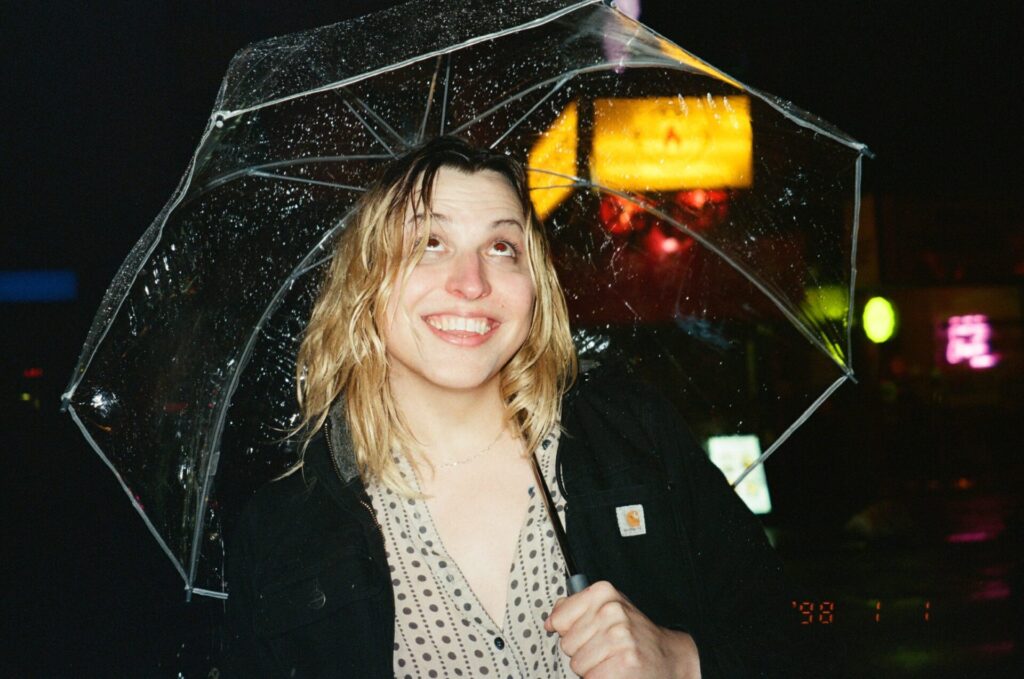
There is a sense of uncanny isolation as if the listener is stuck in one place as the screamo-operatic track ‘Night Of Fire’, gives the impression that Recovery Girl is emitting tortured vocals in one room while More Eaze plays anxiously surreal violin in another, but then these separated lines mesh together. Elsewhere, beautiful string arrangements are corrupted by drilling noise or absorbed by digital chaos. This dichotomy is heard in ‘Christian Rock’, where through harshness shines More Eaze’s processed vocals lifted by multiple layers of violin.
“Mari is extremely open-minded and she deeply understands or hypotheses quite well about what the intention is even without discussion,” says Seth Graham, the co-founder of Orange Milk. “This, to me, is an impressive skill not many can wield. She is somewhat the epitome of Orange Milk, as she has no regard for the genre and has found her unique approach and voice.”
Graham was raised in an intensively Christian household between Ohio and Japan, where his parents worked as missionaries. On Night Of Fire, he wrestles with his Christian upbringing: “In my teen years, between sixteen and nineteen, I often went to Christian hardcore shows in Ohio. I wasn’t allowed to go to non-Christian music events, so I was relegated to whatever Christian shows were happening around,” he explains over an email, where screamo influences come from.
“During this time in Ohio, a lot of hardcore and early emo was happening. I particularly loved this band called Zao, specifically a record called Where Blood And Fire Bring Rest. The singer then was Daniel Wyandt, and I particularly loved how his screaming sounded. I asked Galen Tipton to record screaming that imitated Daniel Wyandt’s voice for Night Of Fire. I chopped those up and used them throughout the record. I really wanted it to feel like lonely hardcore, almost out of place anger.”
The track ‘Christian Rock’ has many facets for him, blending evangelical Christianity in Rural America, gentrification, and classism into one force. Equally, Night Of Fire is inspired by the mundane weirdness of living in a city like Dayton, where Graham is based, near “gas stations, drag race tracks and county fairs”. “[After] growing up in Japan, I see America [from a] third-person perspective [as if] I’m watching with utter fascination.”
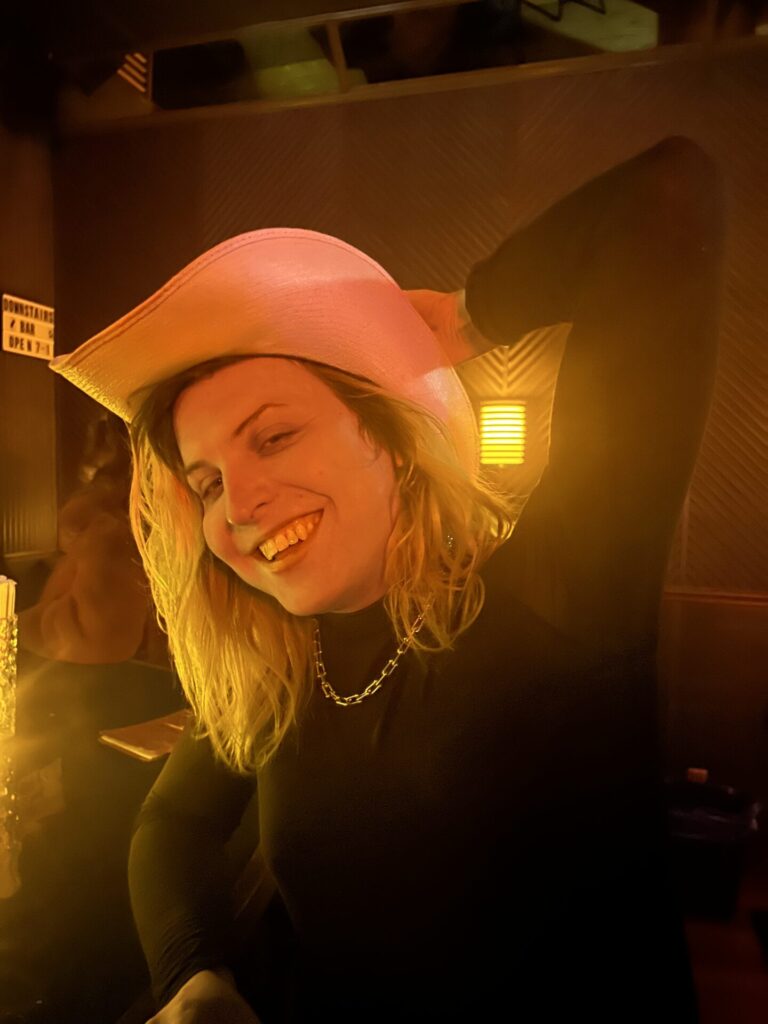
This voyeurism, mixing textures from a dark strange underbelly with the quotidian, is somewhat Lynchian – when this is put to Graham and Maurice, they appear happy. The gory video for ‘Night Of Fire’ shows an unidentified protagonist trapped in a cage of shrink wrap, attempting, bloodily, to escape, intercut with shots of Graham, in a fetching yellow balaclava, squatting in front of a barn holding a sign emblazoned with the slogan “Murder”, while next to the American flag. The clear plastic wrapping evokes some of the aesthetic pleasure Lynch derived from the presentation of the body of Laura Palmer in the pilot episode of Twin Peaks. However, the sense of America that —__–____ create is similar to the atmosphere of Blue Velvet, the neatly cut lawn and blue sky of an idealised suburbs contrast with dark twisted violence lurking beneath the surface.
“The [idea] of the empire and decline is always at the front of our minds. It’s almost like an unspoken thing,” says Maurice confirming that contrasting an idealised America with its hidden rotten schema is their goal. “I grew up in the most classic U.S. suburbs in San Antonio. Once you start to see it, you can’t unsee it; there’s always this sort of malevolence lurking under that, and people in the suburbs – especially in Texas suburban parts – are so fucking scared of literally everything. My mom lives in San Antonio, and there’s an ice cream truck that drives through their neighbourhood – she told me that the next-door people think someone is trying to scope out houses to rob them. It looks so idyllic, but it’s full of paranoia and this weird type of anger and suspicion.”
Even though Maurice is a classically trained violinist, her musical education comes, in her own words, mainly from playing and improvising on fiddle with traditional country musicians. “I grew up at country open mic nights playing a lot of Americana and country adjacent stuff, like my own shitty songs,” says Maurice: “It trains your ear and your skills; Americana is really in my blood from doing that.” She started to play guitar around the age of 14 and only a year after at Winston Churchill High School in San Antonio picked up a violin. Maurice marched with the school’s band on saxophone and played with the orchestra at Carnegie Hall. Later, she studied composition at California Institute of the Arts in Los Angeles, where she got into endurance playing in the vein of Tony Conrad or The Wandelweiser Group, earning a reputation as an extreme violinist who “would do anything on a piece, like a drone for thirty minutes”.
After graduating in 2014, she returned to San Antonio to work full-time as a violin teacher. Simultaneously, a year after, she released her first experimental folk albums, Accidental Prizes and Fine. During this period she was “reconciling past and this love of folk and country music, because I did realise when growing up with these older folk and country guys is some of them had extremely close-minded takes about music – I never believed in the definite idea of form and what you can or can’t do within it.”
She had a productive year in 2020 after coming out as a trans woman. Reinvention came with Mari, a showcase of glistening hyperpop-injected songwriting, while a collaborative tape with Claire Rousay If I Don’t Let Myself Be Happy Now Then When? was assembled from domestic found sounds, field recordings, and guitar snippets. “I first discovered her work around 2016 during the tape trading days when U.S. shipping was still cheap,” remembers Janek Ufnal from Polish label Mondoj, who released the album.
Ufnal and Maurice became friends on social media, and later, More Eaze contributed to one of the tracks on Seth Graham’s 2019 tape Hint on Mondoj. Around that time, Mari mentioned she was working on a tape with her close friend Claire and sent a demo. “We weren’t familiar with Claire’s music yet, but the recording Mari sent us was totally mind-blowing: the mix of so blatantly different palettes, the quiet and loud progressions, the super honest and genuine vibe. I couldn’t stop listening, not as a label-head, but as a fan. The album was a huge success with listeners,” looks back Ufnal.
“It felt like finally being able to hone in on what I wanted to do musically. So much of the music I made as More Eaze before those two releases was so wrapped up in anxiety and I think it sounds that way,” Maurice says. “These were the first two records that felt like they were carving a path forward.” Then her career spread in every possible direction, from refining intricately fragile emo-ambient with Rousay, over forming trio Futurangelics with Dntel to collaborating with Nick Zanca.
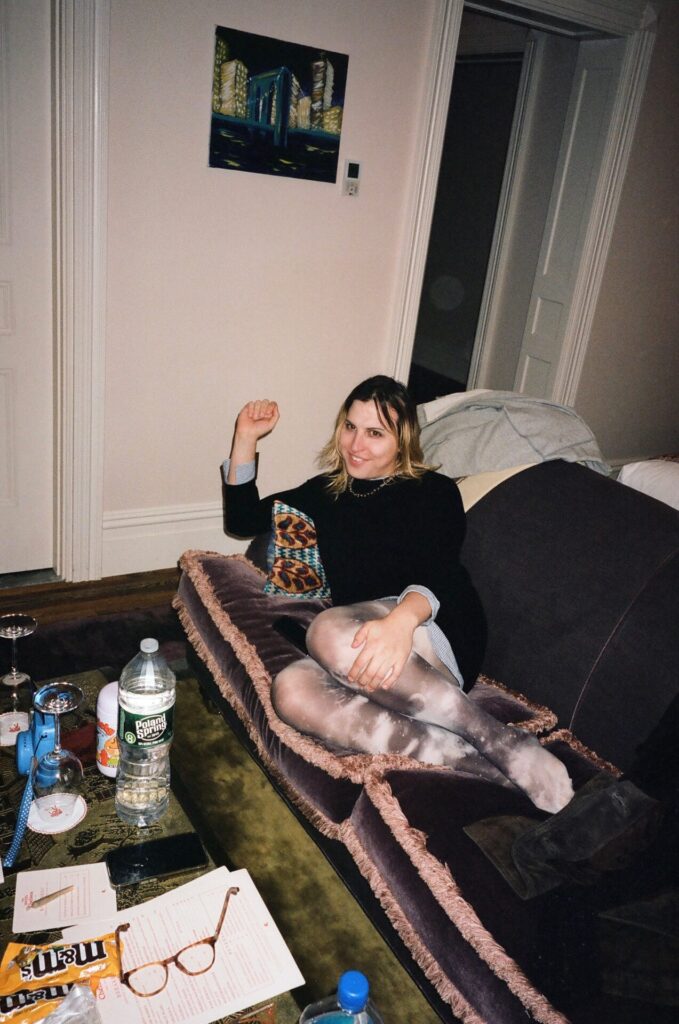
This year has been another creative refresh for More Eaze. Pardo of the Italian label OOH-sounds asked if she wanted to join the project inspired by Wim Wenders’ classic 1984 Paris, Texas. “I have a confession to make, I haven’t seen Paris, Texas. Ever since I was a kid, I have had this problem of wanting to see the most extremely weird thing this person did first and then gradually working the way back to bigger things. So, for instance, American Friend and 1991 Until The End Of The World are my favourite films by Wenders,” Maurice says.
She was very familiar with Ry Cooder’s score to it, though. “Something I love about Ry’s work is that it always seems like a reverential interpretation of various strains of folk music and Americana. The Paris, Texas soundtrack seems like the ultimate reduction and distillation of so much music you actually hear growing up in Texas,” says Maurice of Cooder’s cosmic pedal steel musings.
Glitchy electronica and ambient guitars recorded by Pardo and Glass as the album’s basis is reminiscent of Fennesz, who inspired her to buy an instrument, which she had always dreamt of having. When on tour with indie rock band Lomelda, Maurice started working on her parts for Paris Paris, Texas Texas in hotel rooms. The tour last year earned her enough money to purchase a 1960s model Harlin Brothers Multi-Kord pedal steel guitar with 8 strings and 4 pedals: “Pedal steels are costly, and difficult to get a hold of, also unbearably heavy. The interesting thing about this instrument is that no two models are alike – they all have a different combination of levers and pedals.”
One of her old country mentors gave her advice long ago: “He said if I ever wanted to learn how to play pedal steel, I should lock myself in a room with a bunch of speed for a week and come out knowing how to play. I didn’t quite do that, but I did lock myself in a room for a couple of weeks to learn the ins and outs of the instrument.”
Even though the instrument, especially in its standard tunings used to play traditional country licks, is heavily loaded with connotations in American music, she finds pedal steel utterly liberating: “The instrument is still very new, when you compare it to something violin or guitar, or any of these other instruments, that have know centuries of refinement.” On top of that, she spends sparse time flicking through The Steel Guitar Forum, where “all these guys are coming up with the craziest tunings and are very encouraging”. She adds: “It’s pretty hard to stop, I just practice very obsessively.”
More Eaze explores the existential cosmic potential of pedal steel in the vein of Daniel Lanois and his work with Eno on Apollo: Atmospheres And Soundtracks or the work of Susan Alcorn. On Paris Paris, Texas Texas she summons the ghost of Ry Cooder, but comes to her own conclusions with added electric violin and modular synths, while electric and acoustic textures melt into each other to result in music that is intimate and organic. More Eaze feels an affinity with the new-avant Americana scene represented by Philadelphia-based Sam Wenc, alias Post Moves, Henry Birdsey from Old Saw, and Tongue Depressor.
When you listen through her catalogue, one thing is striking – how a sense of memory of a specific genre intersects with her output; and this is true from her early releases which deal with Americana to albums like 2022’s Never Stop Texting Me, where she and Claire Rousay created a notional hyperpop emo band out of a shared Midwest emo nostalgia. “As someone influenced by composers like ‘Blue’ Gene Tyranny or Robert Ashley, who play with the idea of memory, it has always been a big thing for me, too. Questions of how you grapple with your influence, how you remember something, or how you expect to hear something,” Maurice explains. “I love exploring on a purely musical level but also in terms of how you see those connections to things from the past in contemporary art and life.”
Her upcoming solo album Lacuna And Parlor on Mondoj, set for release in September, tackles the memory issue. Pieces stem from ideas and concepts Maurice worked on towards the end of her studies at CalArts but hadn’t yet fully explored since she didn’t have what she felt was an adequate venue and the right set of collaborators fully on board in Austin. Moving to NYC was a positive change for More Eaze in part because she has been able to write and compose these minimalistic pieces with an ensemble.
Lacuna And Parlor is still rooted in folk and Americana harmony however, and some tracks, like ‘A(nother) Cadence’, even reference older songs from 2015’s Accidental Prizes to form something newly strange yet strangely familiar. The track ‘Materials For Memory’ uses field recordings and found sound to conjure specific memories. They are about “how we are always drawn toward particular types of harmony, movement and motion – it’s getting back into the old me in terms of ideas”.
In the end, it is also Maurice’s way to reconcile with her past and striving for acceptance: “I tried to reject my roots in Americana, but I actually feel more free to embrace that side of things since leaving Texas,” Maurice thinks. “To me, Americana is something much more than this surface. It is deeper and stranger than what a lot of people take it as. It is a very weird and Lynchian type of thing when you start to unpack it. That’s something that many people, who are just playing it straight, miss. Yeah, this shit is fucking weird!”
Night Of Fire is released by Orange Milk Records on 30 August. Paris Paris, Texas Texas and In E are out now

